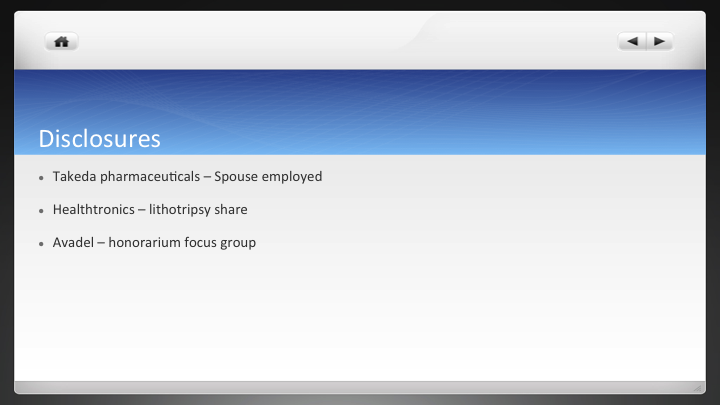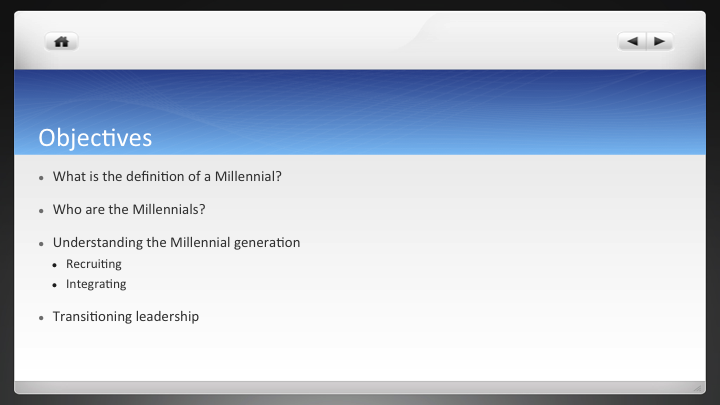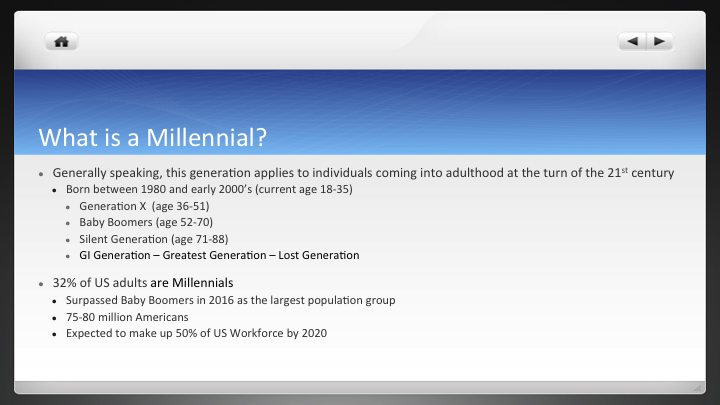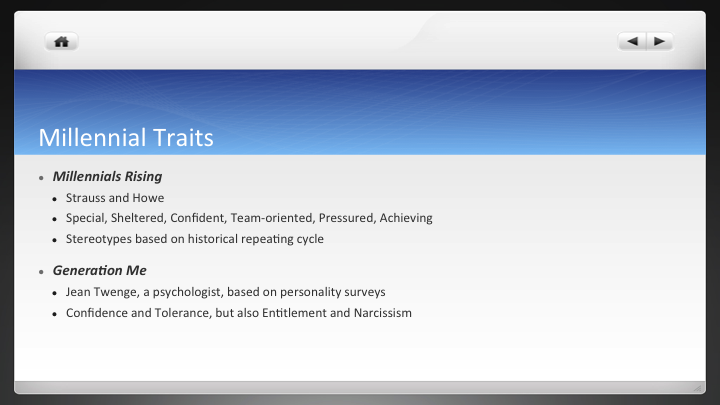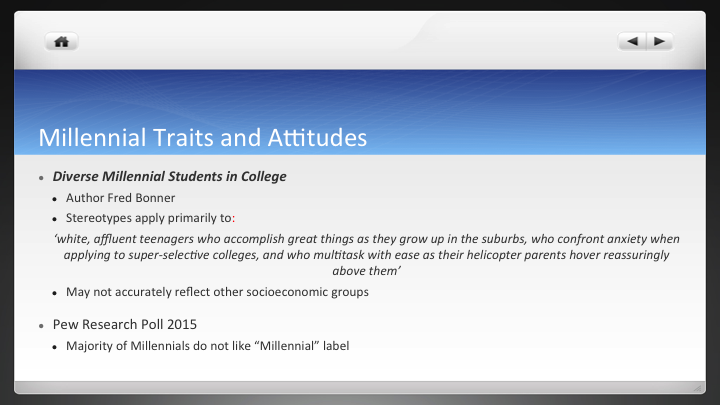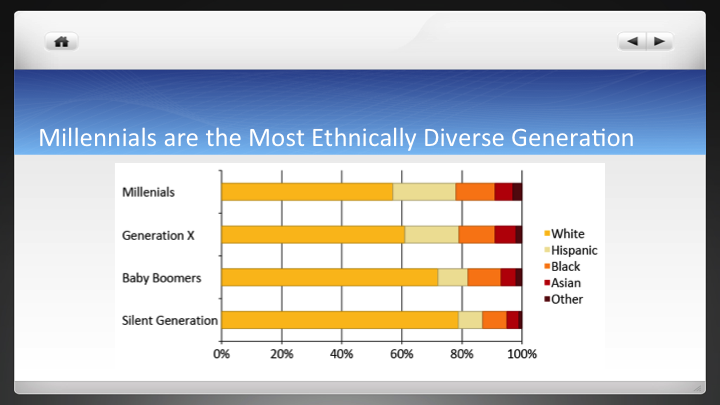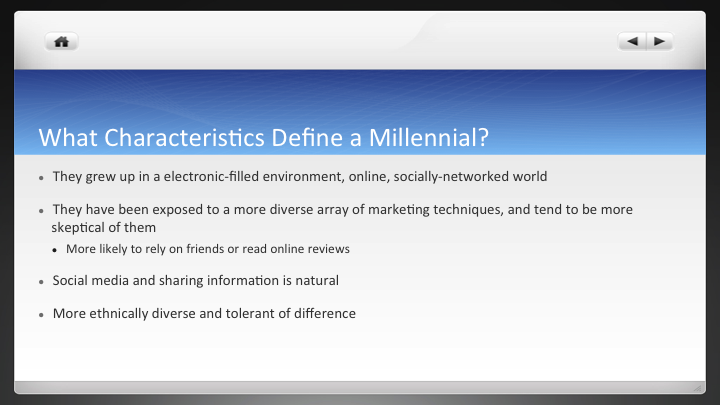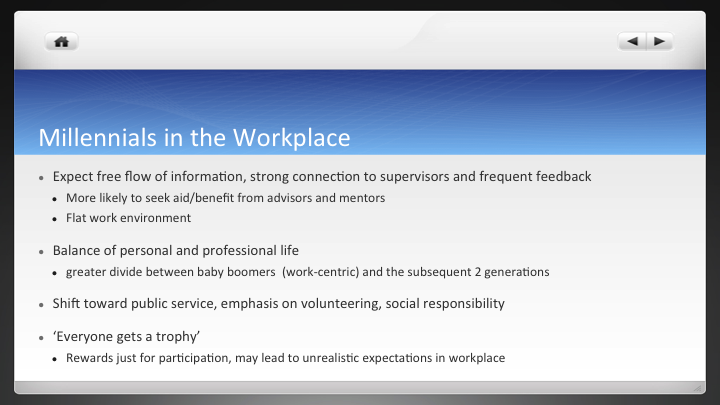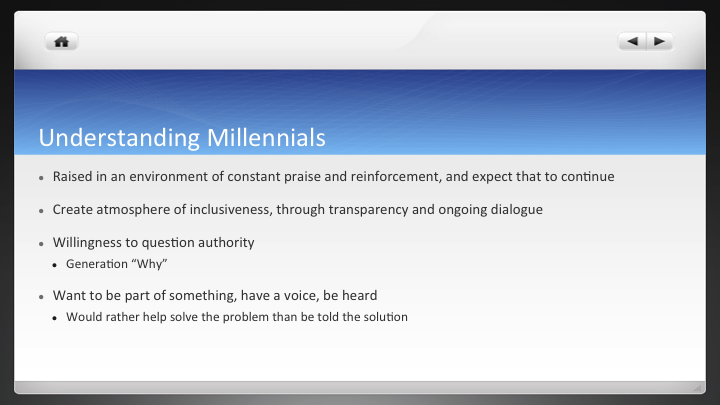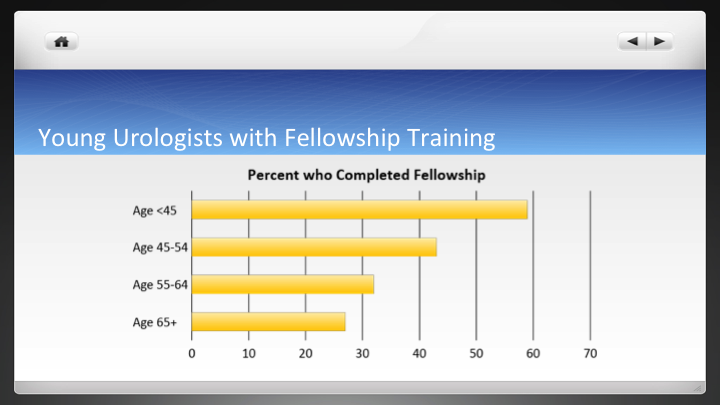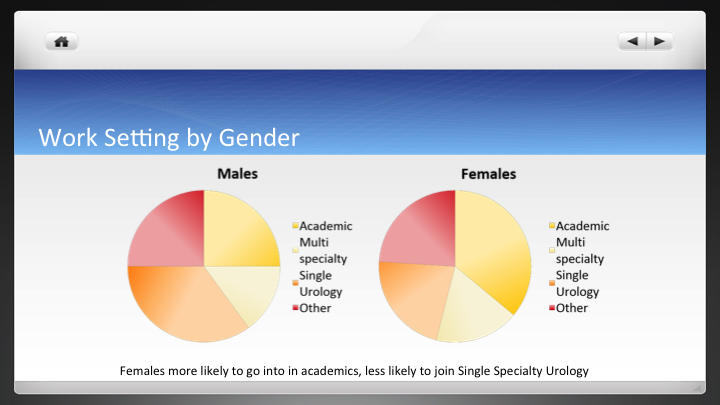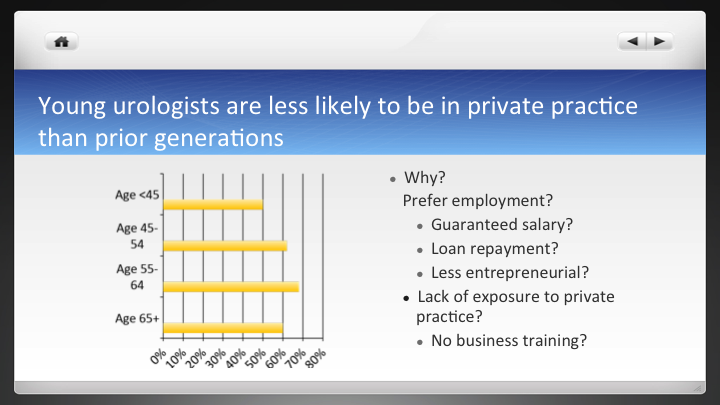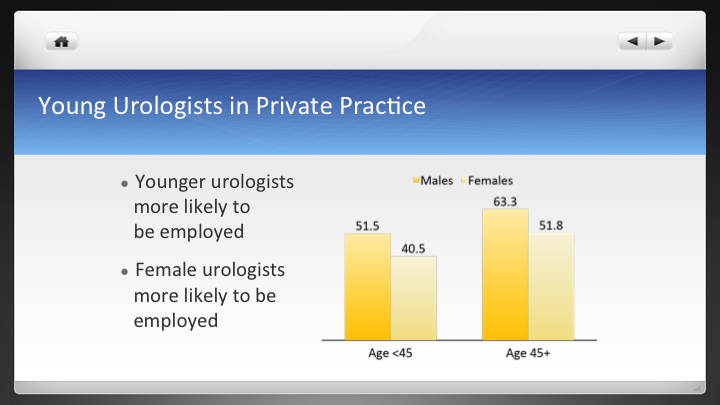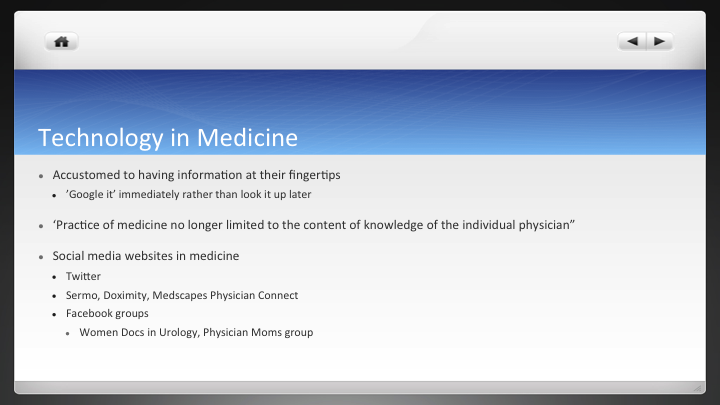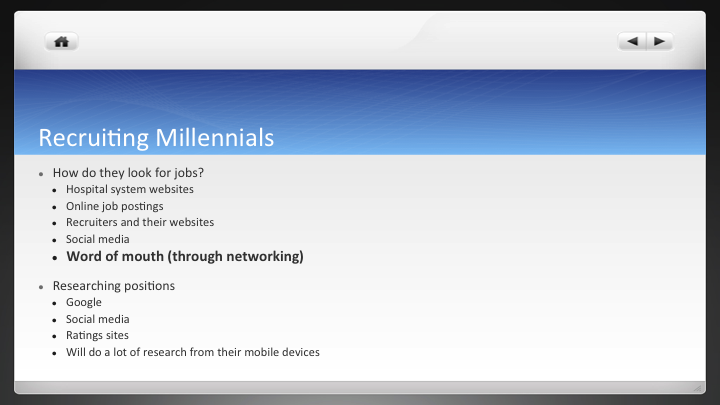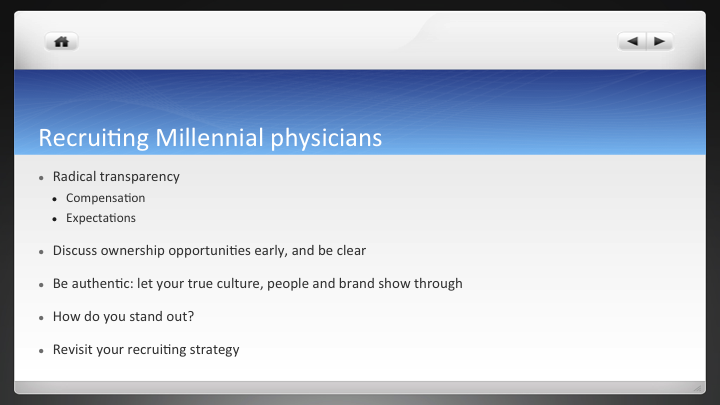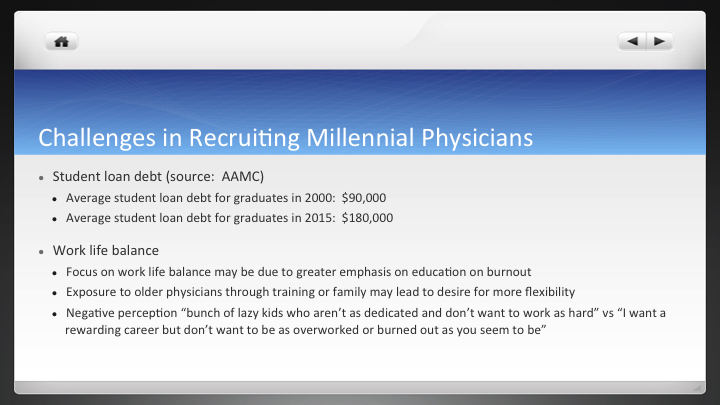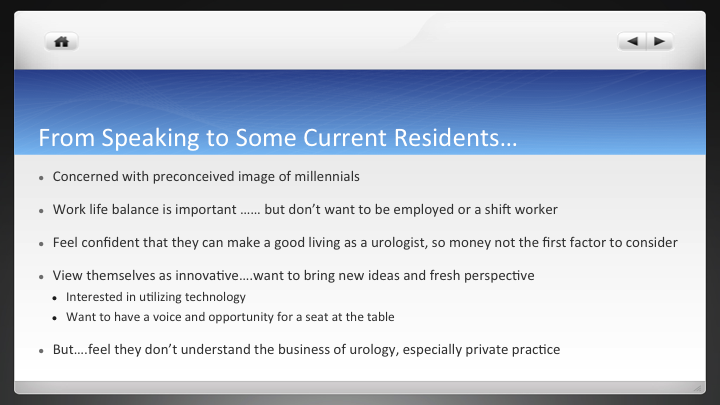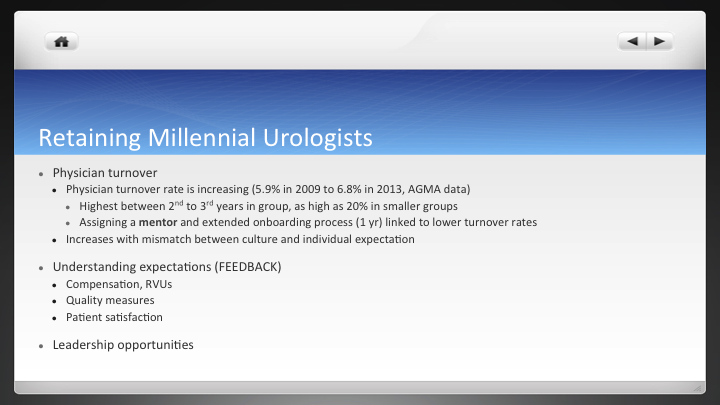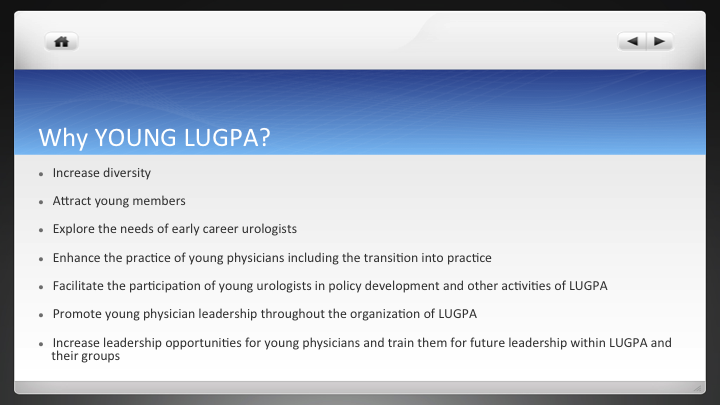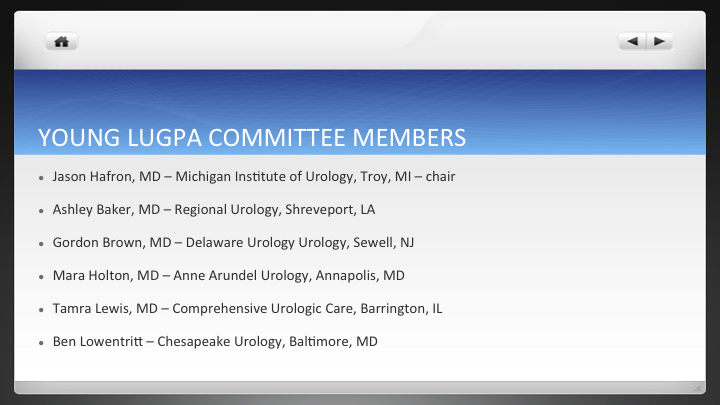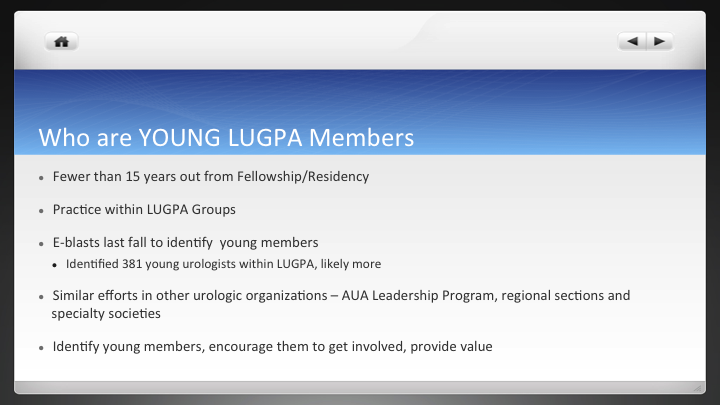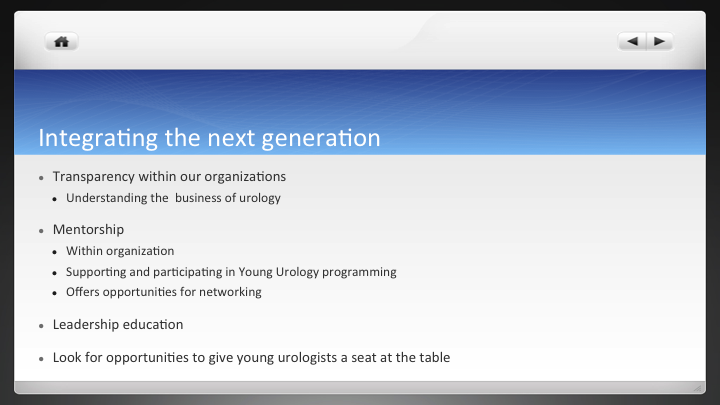How to cite: Lewis, Tamra. “The Role of the Young Urologist – What Makes Millennials Tick?” January 27, 2018. Accessed [date today]. https://dev.grandroundsinurology.com/The-Role-of-the-Young-Urologist/
Summary:
Tamra E. Lewis, MD, FACS, defines the term “millennial,” discusses urology practice demographics and work culture trends, and talks about how to recruit and retain young urologists in independent practices. She explains how these shifting attitudes and trends led to the founding of the Young Large Urology Group Practice Association (LUGPA) organization.
(Twitter Question) Reveal the Answer to Audience Response Question #1
- A. Someone born after year 2000
- B. Someone between the ages of 18-35 (in 2018)
- C. A rare coin
- D. Someone who has driven the Millennium Falcon
Reveal the Answer to Audience Response Question #2
- A. Homeland Generation
- B. Millennial Generation
- C. Generation X
- D. Baby Boomer Generation
- E. Silent Generation
Reveal the Answer to Audience Response Question #3
- A. A lot higher than the number of urologists over the age of 65
- B. About the same as the number of urologists over the age of 65
- C. A lot lower than the number of urologists over the age of 65
The Role of the Young Urologist – What Makes Millennials Tick?
Click on slide to expand
The Role of the Young Urologist: What Makes Millennials Tick?
So, I was tasked with discussing the role of the young urologist or the Millennial urologist.
Objectives
My objectives, so first define what a Millennial is, who the Millennials are as a group, how that fits with the practice of urology, and then talk about future leadership.
What is the Millennial Generation?
William Strauss and Neill have described a theory of recurring generation cycles in American History. A social generation is made up of a group of people born over a span of roughly 20 years, or about the length of one stage of life, childhood, young adulthood, midlife, et cetera. Generation is defined by three characteristics. There’s age location in history, i.e. they’ll encounter key historic events at roughly the same stage of their life, they share common beliefs and behaviors and they have a perceived membership in that group.
What is a Millennial?
So the Millennial generation applies to individuals who are coming into adulthood at the turn of the century, so born between about 1980 to 2005 which would make them roughly 18 to 35 years old today. Prior generations would be Generation X, the baby boomers, the silent generation and then prior generations would be the GI generation, lost generation according to Ernest Hemingway or the lost generation, the greatest generation according to Tom Brokow. Today 32% of US adults are Millennials. They surpassed the baby boomers in 2016 as the largest population group, 75 to 80 million Americans are expected to make up 50% of the US workforce by 2020.
Millennial Traits
So, traits attributed to Millennials by Strauss and Howe include special, sheltered, confident, team oriented, pressured and achieving and these are based on a historical repeating cycle and based on the cycle, they predicted the Millennials would share traits with the civic minded GI generation. Personality surveys of Millennials identified traits of confidence and tolerance, but also entitlement and narcissism.
Millennial Traits and Attitudes
So, this may hold some selection bias as the Millennials assess tend to be white, affluent teenagers who accomplish great things as they grow up in the suburbs, who confront anxiety when applying to super selective colleges, and who multitask with ease as their helicopter parents hover reassuring above them. This may not accurately reflect other socioeconomic groups. A Pew Research Poll in 2015 found that the majority of Millennials actually did not like the Millennial label.
Millennial Traits
Time Magazine ran a cover story in 2013 called “Millennials: The Me Me Me Generation” that put a slightly more positive spin. The advances in technology have empowered individuals by giving them the resources to compete against larger organizations, think hackers versus corporations, YouTube creators versus traditional studies, app makers versus entire industries. Millennials may not always respect authority. It’s not that they resent or rebel against it, they just don’t always feel that they need the institution. To them, the world is more flat in terms of hierarchy. They are optimistic. They can be entrepreneurial. They are better informed and they are willing to challenge convention to find a better way to do things.
Millennials are the Most Ethnically Diverse Generation
They are the more ethnically diverse generation.
What Characteristics Define a Millennial?
They grew up in an electronic filled, online, socially networked world. They have been exposed to diverse array of marketing techniques and tend to be much more skeptical of them. Social media and sharing, or sometimes over sharing, of information is natural and, as I showed before, they are more ethnically diverse, and therefore likely more tolerant of difference.
Workplace Attitudes
So, workplace attitudes. Baby boomers value loyalty, work ethic, a steady career path and compensation. Generation X, there’s a transition to an improved work life balance with a heightened focus on individual advancement, stability and job satisfaction. The Millennials shows emphasis on producing meaningful work, finding a creative outlet, and have a preference for immediate feedback. They introduce, introduction of social media has augmented some collaborative skills and create a preference for a team oriented environment.
Millennials in the Workplace
Millennials expect free flow of information and have a strong connection to their supervisors and like frequent feedback. They are more likely to seek aid or benefit from their advisors or mentors and this creates a more flat work environment. They do expect more of a balance of personal and professional life, and there is a greater divide between the baby boomers for a more work-centric generation, and the subsequent two generations. There’s a shift towards public service, emphasis on volunteering and social responsibility, but we also have the idea in school and sports that everybody gets a trophy, and so this may lead to unrealistic expectations in the workplace.
Understanding Millennials
Being raised in an environment of constant praise and reinforcement, they expect that to continue in their adult life. So, understanding Millennials create an atmosphere of inclusiveness through transparency and ongoing dialogue. They expect transparency in the consumer workplace and they are expecting it in medicine as well. There’s a willingness to question authority. Generation Why. They want to be part of something, have a voice and be heard. They would rather help solve the problem than be told the solution.
AUA Census Data
So, here’s that pie graph that kind of shows that. According to the most recent AUA Census Data, there are just over 12,000 practicing urologists in 2016. Females make up 8.5% of the urologists in practice, but under the age of 45, almost 20% of urologists are female.
Young Urologists with Fellowship Training
More young urologists have fellowship training than the previous generations.
Work Setting by Gender
And, if we look at practice demographics by gender, females are more like go into academics and less likely to join independent urology groups.
Young urologists are less likely to be in private practice than prior generations
So, it’s similar to last night. There are fewer young urologists overall going into independent private practice, and I kind of pointed this out earlier, than the previous generations. Why is that? Do they prefer employment? They want a guaranteed salary? Is loan repayment an issue? Are they less entrepreneurial, or is it just a lack of exposure to private practice and business training?
Young Urologists in Private Practice
So, if you look at Millennial urologists, females especially are much more likely to be employed physicians.
Technology in Medicine
So, what changes do we see as the Millennials enter the urologic world? There’s a greater alliance on technology. Next generations are accustomed to having information at their fingertips. When confronted with a question, they’ll just Google it rather than write it down and go look it up later, and because of this, the practice of medicine is no longer limited to the content of knowledge of the individual physician. Social medial is definitely here to stay. This is the third urology conference I’ve been to this month, and the prior two each had a talk about social media in urology. There are several websites for physician dialogue that exists as well as Facebook groups.
Recruiting Millennials
So, recruiting Millennials. How do they look for jobs? They look in the traditional platforms, hospital websites, online job posting and recruiters, but they also use social media and word of mouth, and with social media, the network is much wider. They research a lot online using a search engine, social media, rating sites (whether those are good or bad), and a lot of it they’re just going to do from their phones.
Recruiting Millennial physicians
So, they use the transparency in the consumer world and don’t know not to expect it. In the medical world, especially when it comes to things like insurance and billing, is about the least transparent industry except for maybe politics. But, it’s important to be up front about compensation and expectations. So, discussing ownership opportunities early and being clear. Be authentic. Let your true culture, people and brand show through. Also consider how do you stand out from other groups or hospital systems. What makes you different? If you don’t know, it’s a good question to ask, and if you’re not finding what you need, revisit your recruiting strategy.
Challenges in Recruiting Millennial Physicians
There are challenges in recruiting urologists, especially into independent urology practice. Student loan debt has doubled in the last 15 years, and when I talk to some current residents, I was hearing numbers more like $300,000 of student loan debt. With the change in work hour limits during residency and increasing education on burned out, as well as exposure to older physicians through training or family, Millennials want more flexibility, and this can lead to mismatch in goals. Millennials can be viewed as a bunch of lazy kids who aren’t as dedicated and don’t want to work as hard, versus, “I want a rewarding career, but I don’t want to be as overworked or burned out as you seem to be.”
From Speaking to Some Current Residents…
So, I spoke to a bunch of residents nearing graduation currently about their thoughts and these were some of the things that they had said. They are concerned with a preconceived notion of millennials and who they are. Work life balance is important, but most don’t want to be employed or a shift worker. They felt confident that they can make a good living as urologist, so money is not necessarily the first factor they consider. They view themselves as innovated. They want to bring new ideas and a fresh perspective. They are interested in utilizing technology. They want to have a voice and opportunity for a seat at the table, but they feel like they don’t understand the business of urology, especially private practice.
Retaining Millennial Urologists
Physician turnover rate’s increasing. The highest seems to be between the second and third years in practice and this can be as high as 20% in small groups. Assigning a mentor when you bring in a new physician in an extended on-boarding process of a year or more has been linked to lower turnover rates, and turnover does increase with mismatch between culture, and the individual expectations, and so, it’s important to be clear about those expectations and to give feedback regarding compensation, RVUs, quality measures, patient satisfaction and leadership opportunities can help with retention.
Why YOUNG LUGPA?
So, this is part of the drive behind young LUGPA. Our goals are to increase diversity, to attract young members, explore the needs of early career urologists, enhance the practice of young physicians, including the transition into practice, facilitate the participation of young urologists in policy development, and other activities of LUGPA, promote young physician leadership throughout the organization of LUGPA, and increase leadership opportunities for young physicians, and train them for future leadership within LUGPA within their own groups.
Who are YOUNG LUGPA Members?
Who are young LUGPA members? So, they are fewer than 15 years out from fellowship and residency. They practice within LUGPA groups. We sent out some E-blasts last fall to help to try to identify some of the young members, and the last count I heard was 381 young urologists, there’s likely more out there. There are also similar efforts in other urologic organizations, the AUA young leadership program, the regional sections are starting to show some interest, and specialty societies. And, the goal of all of these is to try to identify young members, encourage them to get involved, and to provide value to them.
Integrating the next generation
Integrating the next generation. It’s important to have transparency within our organizations and to help the younger generation to understand the business of urology. Mentorship is key both within the organization and beyond, and you can help by supporting and participating in Young Urology programming. This also offers the opportunity for networking with potentially future people who might want to join your group. Leadership education is important, and I encourage you to look for opportunity to give young urologists a sit at the table.
ABOUT THE AUTHOR
Dr. Lewis is a private practice urologist at Comprehensive Urologic Care in the Chicago suburbs. Dr. Lewis received her BA in Biology from Luther College in 1994, and she obtained her MD in 1999 from the University Of Iowa College Of Medicine. In 2005, Dr. Lewis completed her Surgical and Urology residencies at the University of Nebraska and then went on to complete a Fellowship in Female Urology and Voiding Dysfunction at Metro Urology in Minneapolis/St. Paul, Minnesota. She was among the first group of urologists to receive board certifications in Female Pelvic Medicine and Reconstructive Surgery.
Dr. Lewis’ professional interests include management of incontinence, voiding dysfunction, bladder prolapse, and urinary tract infections. She is a Fellow of the American College of Surgeons, and a member of the American Urological Association, the Society of Urodynamics, Female Pelvic Medicine and Urogenital Reconstruction (SUFU), and the Society of Women in Urology. She is also a board member and past-President of the Chicago Urological Society. Dr. Lewis has been an invited speaker or presenter for numerous events on topics including overactive bladder, hematuria, and urinary tract infections.


